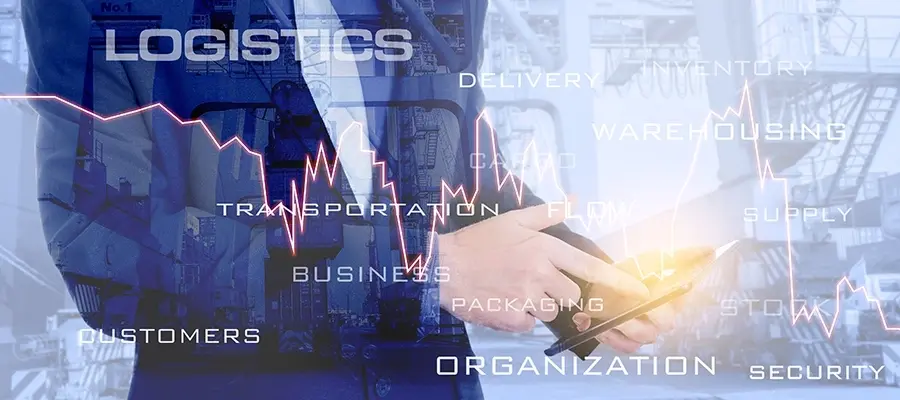In the digital age, eCommerce has undergone a remarkable transformation, changing the way we shop, consume, and even how businesses operate. The eCommerce impact on logistics has been profound, giving birth to a new era of supply chain marketing and revolutionizing the trends in supply chain and logistics.
To appreciate the true magnitude of the eCommerce impact on logistics, consider this striking fact: In 2020, global eCommerce sales reached a staggering $4.28 trillion, a number that's expected to continue its upward trajectory.
This seismic shift in consumer behavior, driven by the ease of online shopping and the diversity of available products, has unleashed a transformative ripple effect throughout the logistics industry. As we delve deeper into this blog, we will uncover how eCommerce is not merely changing the way we shop, but is, in fact, reshaping the very foundations of supply chain marketing, influencing the latest trends in supply chain and logistics, and presenting an array of challenges in the logistics industry that demand innovative solutions.
Let’s also delve into the multifaceted dynamics of how eCommerce has created a ripple effect in the logistics industry, ushering in an era of unprecedented challenges and innovations.
eCommerce Impact on Logistics
The convergence of eCommerce and logistics has been a game-changer in the world of business. With the advent of online shopping platforms like Amazon, Alibaba, and eBay, consumers have gained a new level of convenience in purchasing products, from groceries to high-end electronics, all from the comfort of their homes. This shift in consumer behavior has necessitated a significant transformation in the way logistics and supply chains operate. eCommerce, with its reach and immediacy, has been the driving force behind the evolution of the logistics industry. One might ask, what is the eCommerce impact on logistics? It can be succinctly defined as a chain reaction of changes across the supply chain. Let’s explore further!
Supply Chain Marketing in the Digital Age
One of the most notable effects of eCommerce on logistics is the rise of supply chain marketing. Traditional marketing strategies relied heavily on physical stores and limited reach. However, with the rise of eCommerce, marketing strategies have taken a digital turn. Online advertisements, social media marketing, and personalized recommendations have become integral to the eCommerce experience.
eCommerce companies, often driven by data analytics and AI, have harnessed the power of consumer data to offer tailor-made product recommendations and targeted marketing campaigns. This data-driven approach not only boosts sales but also streamlines logistics operations. By predicting consumer behavior and demand, eCommerce companies can optimize their supply chain, leading to cost savings and increased efficiency.
Moreover, eCommerce platforms have become marketing powerhouses themselves. They provide a platform for third-party sellers, creating a vast marketplace that further complicates logistics management. This new landscape necessitates innovative supply chain marketing strategies that help companies stand out in a crowded marketplace. It's not just about delivering products; it's about creating a seamless and memorable customer experience.

Challenges in the Logistics Industry
In today's eCommerce landscape, thriving businesses require more than just streamlined logistics. While efficient supply chain management is undeniably essential, it is but one piece of the puzzle. A strong online presence is equally paramount to not only survive but to excel in this increasingly competitive digital realm. This is precisely where digital marketing steps in as the catalyst for success. Digital marketing encompasses a spectrum of strategies, from search engine optimization (SEO) and content marketing to social media advertising and email campaigns, all designed to bolster a company's visibility, engage its audience, and drive conversions. Without a robust digital marketing strategy, even the most efficient logistics can fall short in the quest to capture and retain customers in the vast and dynamic world of eCommerce.
Complex Target Audience: Identifying and reaching the right audience can be intricate in logistics, as customers may range from individual consumers to global corporations. Tailoring marketing efforts to each segment is demanding.
Data Management: The logistics sector generates vast amounts of data, which, if not efficiently managed, can lead to inefficiencies and missed opportunities for personalization and optimization.
Competition and Visibility: The digital landscape is saturated, making it challenging for logistics companies to stand out. Achieving online visibility amid fierce competition requires strategic digital marketing efforts.
Trust and Reputation: In logistics, trust is paramount. Building and maintaining a stellar online reputation is vital, and negative feedback or public relations issues can have a significant impact on business.
Regulations and Compliance: Navigating the complex web of regulations and compliance standards in the logistics industry while maintaining effective digital marketing practices can be a considerable challenge.
Marketing Trends in Supply Chain and Logistics
Here are five marketing trends in the supply chain and logistics industry:
Digital Transformation: The industry is embracing digital technologies like IoT, blockchain, and AI to optimize operations and enhance visibility. Marketing efforts are focusing on showcasing these technological advancements to attract tech-savvy customers and partners.
Sustainability and Green Logistics: With growing environmental concerns, sustainability is a key marketing trend. Companies are emphasizing their eco-friendly practices, from energy-efficient transportation to reduced packaging waste, to attract environmentally conscious clients.
Real-time Visibility: Real-time tracking and monitoring solutions are becoming more prevalent. Marketing efforts are highlighting how these technologies provide customers with precise, up-to-the-minute information about their shipments, boosting transparency and reliability.
Personalization: Tailoring services to individual customer needs is on the rise. Marketing strategies are using data analytics and AI to offer personalized logistics solutions and demonstrate how they can improve efficiency and customer satisfaction.
eCommerce Integration: The growth of eCommerce has led to a need for seamless integration between eCommerce platforms and logistics services. Marketing campaigns are focusing on showcasing how logistics companies can facilitate and enhance the e-commerce supply chain, ensuring fast and efficient order fulfillment.

Supply Chain and Logistics Services in the eCommerce Era
eCommerce has transformed not only the retail landscape but also the way supply chain and logistics services operate. Let's explore the ways in which logistics services have adapted to meet the demands of the digital age.
1. Fulfillment Centers: eCommerce companies have increasingly turned to third-party fulfillment centers to streamline their operations. These centers handle storage, order processing, and even packaging, allowing companies to focus on their core business.
How can digital marketing help?
Digital marketing can help fulfillment centers by creating an online presence and promoting their services. Content marketing, including blog posts and case studies, can showcase their efficiency, technology, and success stories. Social media and pay-per-click advertising campaigns can target eCommerce businesses looking for third-party fulfillment solutions, highlighting how these centers can streamline operations, reduce costs, and improve order fulfillment speed.
2. Technology Integration: The adoption of cutting-edge technology is crucial in the eCommerce impact on logistics. From route optimization software to track and trace systems, technology is driving efficiency and transparency in logistics.
How can digital marketing help?
Digital marketing can highlight a logistics company's commitment to technology integration by showcasing their advanced systems and capabilities. Content such as videos and webinars can explain how these technologies enhance efficiency and transparency. SEO optimization can ensure that when businesses search for technology-integrated logistics solutions, the company's website ranks high in search results. Additionally, email marketing can keep clients informed about new tech advancements.
3. Cross-Border Shipping: eCommerce has created a global marketplace, and logistics providers have adapted by offering efficient cross-border shipping solutions. International trade, once complicated, is now made more accessible.
How can digital marketing help?
Marketing efforts can emphasize a logistics provider's expertise in cross-border shipping. Content marketing can include informative guides on international shipping regulations, customs procedures, and cost-effective strategies. Targeted social media advertising can reach businesses involved in international trade, showcasing how the logistics company simplifies cross-border logistics
4. Customer-Centric Approaches: eCommerce companies often require logistics providers to offer customer-centric services such as same-day delivery, time slot selection, and real-time tracking. This level of personalization is a key differentiator in the industry.
How can digital marketing help?
Digital marketing can spotlight the logistics provider's customer-centric services. Website optimization and content creation can detail the range of personalized services offered, like same-day delivery, time slot selection, and real-time tracking. Social media and email marketing can engage customers and share success stories of timely and personalized deliveries, building trust and loyalty.
Navigating the eCommerce Revolution in Logistics
The eCommerce Impact on Logistics is profound and multifaceted. The ripple effect of eCommerce continues to reshape the industry, creating new possibilities and challenges for businesses and consumers alike. eCommerce, with its remarkable growth and transformative influence, has not only redefined the way we shop but has catalyzed a cascading series of adjustments throughout the logistics industry. From the evolution of supply chain marketing to the emergence of new trends and the confronting of formidable challenges, the partnership between eCommerce and logistics is reshaping the world of business.
As we conclude, it is evident that the ripple effect of eCommerce in logistics is far from complete. With hyperlocal delivery, AI-driven optimization, and an unyielding commitment to sustainability, the future holds a promise of further transformation and improvement. This ever-evolving synergy between eCommerce and logistics offers both businesses and consumers an exciting frontier, where convenience and efficiency coalesce to shape the way we access the products we desire.
To remain competitive and meet the ever-growing expectations of consumers, companies in the logistics and eCommerce sectors must remain agile and adaptable. The journey may be challenging, but the rewards in terms of customer satisfaction, operational efficiency, and profitability are immense. The eCommerce Impact on Logistics is not just a current trend but a fundamental shift that is shaping the future of commerce. It is a revolution that continues to unfold, and those who embrace it with ingenuity and determination will be best positioned to thrive in this dynamic landscape. To navigate this shift successfully, companies must proactively connect with digital marketing experts who can help them harness the power of online strategies, ensuring their services and innovations are effectively communicated to their target audience, ultimately solidifying their competitive edge in this evolving landscape.
Take the First Step Towards Logistics Excellence
Ready to revolutionize your logistics game with Vajra Global? Don't miss out on the future of supply chain excellence. Contact us today and discover how we can optimize your logistics operations, enhance your supply chain marketing, and propel your business to new heights. Let's embark on a journey towards efficiency, sustainability, and customer satisfaction together. Join Vajra Global, and let's redefine logistics, hand in hand.

